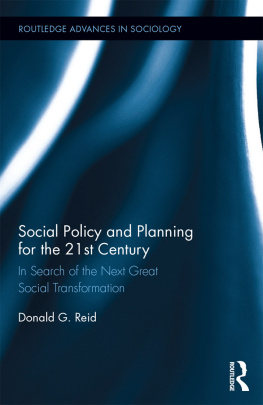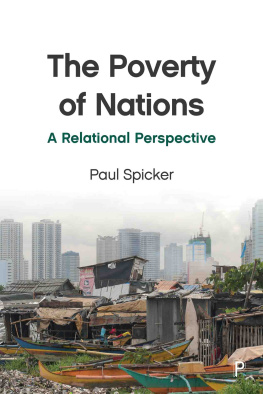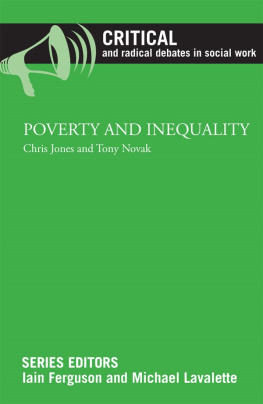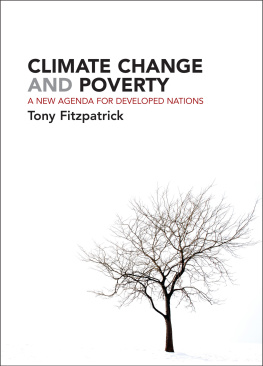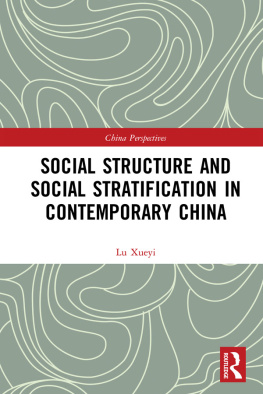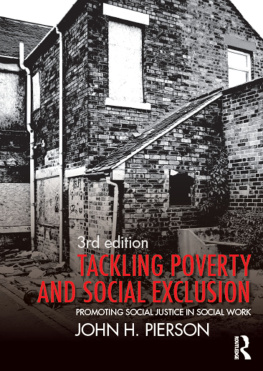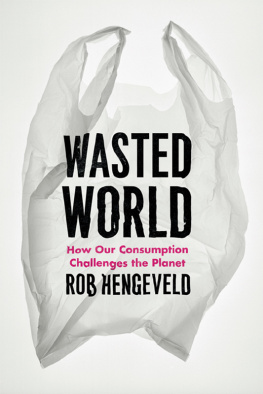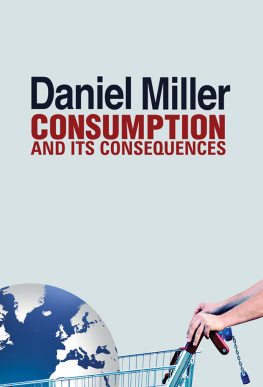Social Policy and Planning for the 21st Century
The greatest problems facing humanity today are climate change, poverty, and the increasing separation between the rich and poor. The aim of this book is to examine the social constructions that have led to these breakdowns and provide potential solutions that are based on a fundamental change in the structure of society and the values on which a new and better social system can be built.
Unless we as a society set a drastically different course soon, human life as we know it will suffer greatly, perhaps even cease altogether. Excess consumption is becoming anti-social as the effects of global warming and increasing poverty become apparent. What, then, will form the new social values on which society replaces the present emphasis on work and material consumption that now prevail? This books answer to that question is accomplishment and aesthetic consumption. The proposed refocused existence will necessitate a new economic order that provides access to a livelihood beyond the market system.
This groundbreaking book will appeal to students and scholars of sociology, leisure studies, political science, and social work.
Donald G. Reid is University Professor Emeritus in the School of Environmental Design and Rural Development at the University of Guelph, Canada.
Routledge Advances in Sociology
177The Decent Society
Planning for Social Quality
Pamela Abbott, Claire Wallace and Roger Sapsford
178The Politics and Practice of Religious Diversity
National Contexts, Global Issues
Edited by Andrew Dawson
179So Paulo in the Twenty-First Century
Spaces, Heterogeneities, Inequalities
Edited by Eduardo Cesar Leo Marques
180State Looteries
Historical Continuity, Rearticulations of Racism, and American Taxation
Kasey Henricks and David G. Embrick
181Lesbian, Gay, Bisexual and Trans* Individuals Living with Dementia
Concepts, Practice and Rights
Edited by Sue Westwood and Elizabeth Price
182Family, Culture, and Self in the Development of Eating Disorders
Susan Haworth-Hoeppner
183Origins of Inequality in Human Societies
Bernd Baldus
184Confronting the Challenges of Urbanization in China
Insights from Social Science Perspectives
Edited by Zai Liang, Steven F. Messner, Youqin Huang and Cheng Chen
185Social Policy and Planning for the 21st Century
In Search of the Next Great Social Transformation
Donald G. Reid
Social Policy and Planning for the 21st Century
In Search of the Next Great Social Transformation
Donald G. Reid
First published 2017
by Routledge
711 Third Avenue, New York, NY 10017
and by Routledge
2 Park Square, Milton Park, Abingdon, Oxon OX14 4RN
Routledge is an imprint of the Taylor & Francis Group, an informa business
2017 Taylor & Francis
The right of Donald G. Reid to be identified as author of this work has been asserted by him in accordance with sections 77 and 78 of the Copyright, Designs and Patents Act 1988.
All rights reserved. No part of this book may be reprinted or reproduced or utilised in any form or by any electronic, mechanical, or other means, now known or hereafter invented, including photocopying and recording, or in any information storage or retrieval system, without permission in writing from the publishers.
Trademark notice: Product or corporate names may be trademarks or registered trademarks, and are used only for identification and explanation without intent to infringe.
Library of Congress Cataloging-in-Publication Data
Names: Reid, Donald G., author.
Title: Social policy and planning for the 21st century : in search of the next great social transformation / Donald G. Reid.
Description: Abingdon, Oxon ; New York, NY : Routledge, 2017. | Series: Routledge advances in sociology ; 185
Identifiers: LCCN 2016007994 | ISBN 9781138674059 (hardback) | ISBN 9781315561530 (e-book)
Subjects: LCSH: Social policy. | Social planning. | Social problemsHistory21st century.
Classification: LCC HN18.3 .R449 2017 | DDC 303.3dc23
LC record available at http://lccn.loc.gov/2016007994
ISBN: 978-1-138-67405-9 (hbk)
ISBN: 978-1-315-56153-0 (ebk)
Typeset in Times New Roman
by Apex CoVantage, LLC
Contents
A number of people have been very helpful in developing the ideas contained in this book. First, I want to thank Tim Brookes for helping me clarify many of my thoughts on the subjects elaborated herein. Tim and I spent many interesting hours overlooking the ocean, drinking coffee as we talked and debated these ideas. Thanks to Patricia MacPherson for her continued support. Patricias ongoing encouragement is greatly appreciated. I wish to thank Nicole Gosselin for the many hours she spent editing this book. Editors are underappreciated but add much to the final product. Also, a number of people, including Hilary Black, Jennifer Burns, Shawn Filson, Sarah Mahato, Maanpreet Sian, Rana Telfah, and Nicole Vanquaethem, read the draft manuscript and made valuable comments, many of which contributed to the final version of this book.
The social and environmental basis on which modern life is constructed is deteriorating. News, including print, broadcast, and social media, is increasingly concerned about the consequences of climate change, growing poverty, and increasing separation between the rich and poor. The aim of this book is to examine the social constructions that have led to these failures in modern society and provide some ideas with regard to how civilization might set a different course; one that requires a fundamental change in the structure of society and the values on which a new and better social system could be built. Let there be no mistakeunless we as a society set a drastically different course soon, human life on this planet may suffer greatly, perhaps even cease to exist altogether.
The first part of this book sets out the present condition of society and highlights some of the major entanglements that have caused the problems facing humanity today. It focuses on identifying the issues that accompany climate change, the drastic separation of the rich and poor, and the underlying basis for poverty in the face of increasing affluence for some. These conditions have become embedded in our modern culture.
Culture is the organizing force that provides structure to human individual and social existence, and this book examines the role it plays in constructing social life. Culture is the lens through which Homo sapiens interpret and create their everyday social world. As cultures mature, many false consciousness are created to help society reaffirm itself in the face of changing social environments. False consciousness is an inevitable by-product of culture as humans attempt to hang on to the aspects of their lives that give them comfort even though they may now be inhibiting the proper functioning of society. These practices may spell the doom for a society that is unable to see the negativities for what they are and search out more appropriate explanations for the changing conditions they confront. One such false consciousness is our notion of wealth creation and the process we have created for its distribution. The overwhelming focus of society on wealth creation at the expense of other life-sustaining values is an issue that needs to be addressed if social and environmental integration is to be sustained. Culture and the values it creates are major evolutionary devices in the lives of humans that play a deterministic role in social change, much like genes play in biological evolution. In fact, culture may now be more important than biology in determining the future of humankind. What gets established as humanitys culture in the future will determine the fate of society over the near and long term.

